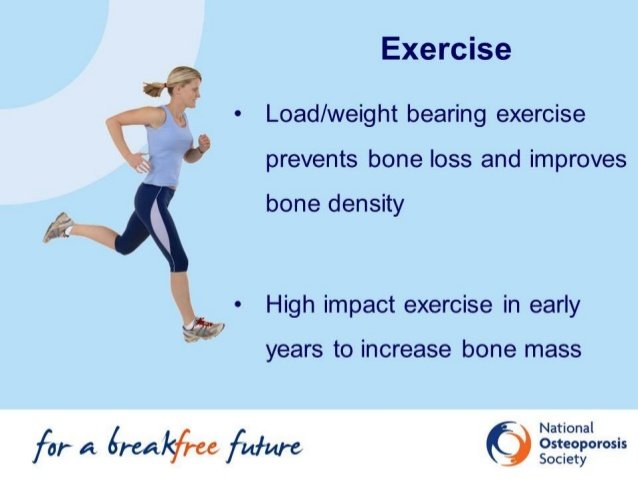Exercise for Osteoporosis.
Osteoporosis is a disease that causes the bones to become brittle leading to a higher risk of fractures. Osteoporosis occurs when bones lose minerals like calcium more quickly than the body can replace them, thereby causing a loss of bone density or mass. When bones lose density and become thinner, things like a minor bump or fall can cause a fracture. Any bone in the body can be affected by Osteoporosis but the most common bones affected are in the hip, spine and pelvis. Sometimes fractures can be minor, partial breaks in a bone while other times a fracture may be a complete break. Over time fractures can lead to a loss of independence, disability and chronic pain. Spinal compression fractures can take place suddenly with or without pain and are characterized by a loss of height and a stooped posture. It is therefore very important to manage bone health to reduce the risk of fractures.
Regular exercise plays an important role in Osteoporosis as exercise helps to increase the size, strength and capacity of our muscles to support the skeleton. Load bearing exercises help to promote new bone formation as bone is a living tissue that reacts to mechanical stresses and stimulus, therefore specific exercises can create this mechanical stimulus and promote beneficial effects on bone density. Put simply, with the right amount of impact our bones become stronger. At Goolwa Physio our physiotherapists are skilled at prescribing exercises to assist in the management of Osteoporosis. We are aware that not all types of exercises are beneficial for treating Osteoporosis. For example, exercises that do not include load, i.e. swimming, have been shown to have no significant effect on bone density. Similarly, aerobic exercise alone i.e. walking, has been shown to have minimal effect in reducing the risk of fracture in Osteoporosis. Consequently, it is necessary for someone with Osteoporosis to have a well-rounded exercise routine that includes aerobic exercise as well as load-bearing exercises in order to optimize health outcomes. Balance re-training is also an important part of exercise prescription for someone with Osteoporosis as reducing the risk of falling reduces the risk of fracture.
So now we’ve established that load-bearing exercises are the right kind of exercise for improving bone strength, let’s make it a bit clearer. There are two main forms of load-bearing exercises – firstly where you use your own body weight and secondly where you use gym equipment / free weights.
Weight bearing exercise – for example, skipping, basketball/ netball, aerobics, stair climbing and brisk walking. These exercises are done while on your feet so you are bearing your own body weight, thereby creating load through your bones.
Progressive resistance training – for bicep curls using free weights and using gym equipment such as a leg press machine. These types of exercises become more challenging over time as you increase the weight lifted, thereby gradually increasing the load placed on your bones.
At Goolwa Physio we make sure our clients are constantly challenged when exercising by gradually increasing the weight used, the degree of exercise difficulty and the number of repetitions and sets performed. We also ensure all our clients with Osteoporosis feel safe and comfortable when they’re exercising as some exercises can be potentially harmful in Osteoporosis, for example, repetitive twisting / rotation movements through the spine have an increased risk of fracture. Clinical Pilates is an excellent form of exercise in Osteoporosis as all exercises can be modified and load is gradually increased.
As previously mentioned, balance re-training is also an important aspect of exercise in Osteoporosis. While balance exercises do not directly improve bone density or muscle strength they can help reduce the risk of falls. Falls are a common cause of fracture in people with Osteoporosis so preventing falls becomes an important part of managing bone health. Goolwa Physio run weekly Falls & Balance exercise classes which are a fun and interactive way to help improve your balance. Your physiotherapist will guide you as to what balance exercises are safe to perform. Goolwa Physio are also looking at starting an exercise program specifically for clients with Osteoporosis so stay tuned!
To sum up, appropriate exercise prescription is extremely important in the management of Osteoporosis. Being fitter, stronger and more balanced can help to manage the consequences of having low bone density and can improve quality of life. If you have Osteoporosis and are keen to start exercising, call Goolwa Physio to consult with one of our physiotherapists.


